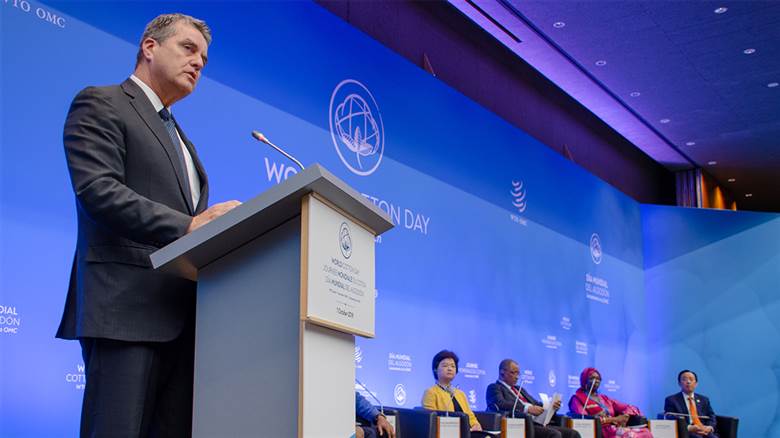Ministers discuss state of the industry at first World Cotton Day

At the kick off to the first World Cotton Day, held 7 October at the World Trade Organization (WTO) in Geneva, WTO director-general Roberto Azevêdo was among several high-ranking officials speaking on issues, challenges and successes faced by today’s cotton industry.
Saying he hoped the event would “bring together the cotton, trade and development communities to foster greater value addition and value capture in developing countries,” Mr Azevêdo lauded cotton's central role in livelihoods, job creation and economic stability in several least-developed countries. He went on to highlight challenges faced by cotton farmers, including market access barriers, subsidies provided by some countries and supply-side challenges at home which limit the competitiveness of export-oriented processing.
Mr Azevêdo also praised steps taken by WTO members to support the cotton sector, but said there is still much to be done to “level the playing field for cotton producers, especially in LDCs.”
Joining Mr Azevêdo in the plenary session were WTO general council chair Sunanta Kangvalkulkij, Benin’s trade minister Shadiya Alimatou Assouman, Burkina Faso’s trade minister Harouna Kabore, Chad’s trade minister Achta Djibrine and Mali’s minister of agriculture Moulaye Ahmed Boubacar.
Ms Djibrine reaffirmed the C-4's commitment to multilateral negotiations to find fair, balanced and sustainable solutions to the "thorny issue" of distorting subsidies. “We urge WTO members to find solutions to the realities of millions of Africans unjustly deprived of the fruits of their labour," she said. "Chad favours a combination of a fair-trade approach and coordinated development assistance, which will ensure the sustainability of cotton sectors and will undoubtedly contribute to the sustainable development of African countries.”
Mr Kabore described how, although cotton contributes more than 10% of Burkina Faso’s GDP, almost all production is exported without any processing. His country is taking steps to boost local processing and consumption of cotton products, he said, while making efforts to fight counterfeiting through a national labelling strategy for traditional locally-made products.
Mr Boubacar focused on the issue of domestic support in cotton trade. “African cotton is less than 10% of world production. Despite its qualities, our fibre faces stiff competition, particularly from the estimated $5.9 billion in domestic support in 2017/2018 some countries provided to their producers, resulting in the precariousness of our producers,” he said. He urged WTO members to continue working on addressing this issue.
Ms Assouman discussed cotton’s contribution to poverty reduction, education, health care needs, economic growth and peace, dignity and prosperity, highlighting the social impact that cotton could generate along the value chain and beyond. “Due to the stable development of cotton production and processing activity,” she said, “young people and members of rural communities in the cotton growing areas are not tempted by the risky adventure of migration at sea and other makeshift means and routes of transport.”
“It is often said,” added Ms Assouman, “that ‘when cotton is fine, everything is fine in the C-4 countries’.”
Image: WTO director-general Roberto Azevêdo speaks at the first World Cotton Day Credit: World Trade Organization











